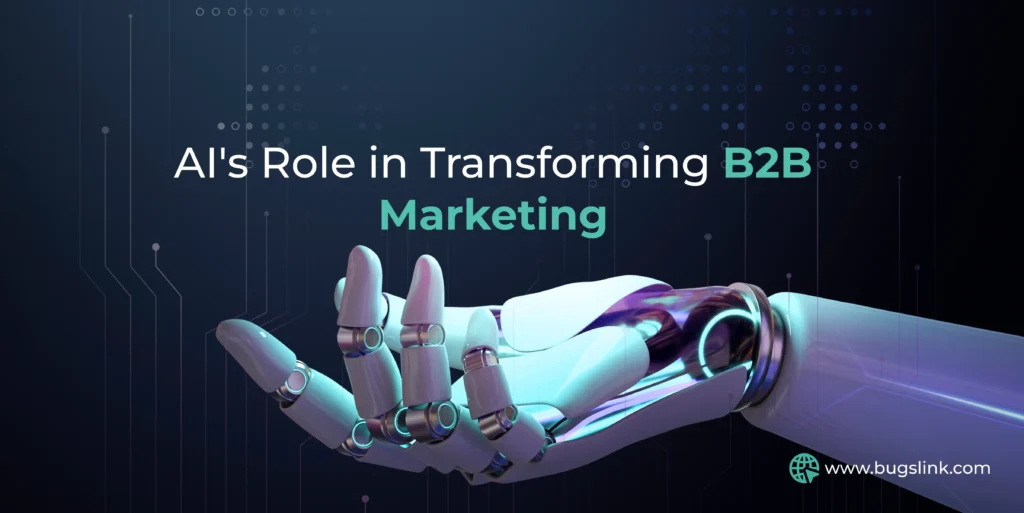Artificial Intelligence (AI) is taking marketing to a new level, particularly in the Business-to-Business service. It reshapes how we reach potential clients, optimize strategies, and personalize experiences. In this blog, I’ll share how AI is transforming B2B marketing, both from a professional perspective and based on the changes I’ve observed in the industry.
AI’s Role in Transforming B2B Marketing

When I first encountered AI tools in marketing, I was a little skeptical. But soon, I realized they weren’t here to replace human expertise; they were here to complement it. AI helps us automate repetitive tasks, make data-driven decisions, and personalize our messaging like never before. It’s a game-changer that’s improving efficiency and effectiveness across the board.
Enhancing Prospecting and Lead Scoring
- Early on, lead scoring was a manual, time-consuming process with inconsistent results.
- AI tools like predictive analytics now help identify high-quality leads in real time.
- AI analyzes user behavior across channels to pinpoint the most likely prospects to convert, streamlining the process.
Developing Consumer Insights
- It is creating accurate buyer personas and ICPs used to involve a lot of guesswork and manual research.
- AI now provides deeper insights into customer preferences, behaviors, and pain points.
- AI-driven insights led to a 30% increase in engagement by adjusting messaging for a specific audience segment.
Improving Customer Experiences
- Poor website experiences were once a significant concern, but AI has optimized these interactions.
- AI-powered tools optimize voice search and deliver personalized content recommendations, improving the user experience.
- This optimization helps businesses stand out in a competitive digital marketplace.
Customizing Marketing Strategies
- Earlier, marketing efforts were broad, but personalization has proven to be the key to higher engagement.
- AI allows businesses to create personalized experiences by analyzing customer data.
- AI-powered tools suggest trending content, recommend products, and tailor messaging based on the buyer’s journey.
Optimizing Website and Application Performance
- Websites and apps with troubleshooting interfaces are time-consuming.
- AI tools like Google Analytics Insights are now alerting businesses to performance issues in real-time, such as high bounce rates or user abandonment.
- AI ensures quick problem resolution, especially on mobile platforms used by B2B businesses.
Facilitating SEO with AI
- SEO used to be time-consuming, involving keyword research and content optimization.
- AI tools now suggest trending keywords, optimize existing content, and generate new ideas based on search trends.
- AI-powered SEO tools help keep content relevant and improve search rankings.
Boosting Client Engagement
- Timing is as important as content when it comes to engagement.
- AI analyzes user behavior to determine the best times to post or send emails.
- AI-powered scheduling tools result in higher click-through rates and better visibility for content.
Enhancing Customer Support and Relationship Building
- Providing excellent customer support used to be time-consuming but AI-powered tools have made it easier.
- Chatbots and interactive voice systems handle routine inquiries, allowing teams to focus on complex issues.
- AI has facilitated round-the-clock support, boosting client satisfaction, loyalty, and long-term relationships.
AI: The Future of B2B Marketing and Why It Matters
As AI continues to shape the business landscape, its role in B2B marketing becomes increasingly essential. Here are three reasons why AI is the future of B2B marketing and why it matters:
- AI-driven insights for personalized customer engagement: With 64% of B2B buyers being millennials and Gen Z, AI-powered tools can help businesses gather deep insights into buyer behavior, preferences, and pain points. This enables hyper-personalized marketing strategies that resonate with these tech-savvy generations, improving engagement and conversion rates.
- Automation and efficiency: AI has transformed B2B marketing by automating repetitive tasks like lead scoring, content generation, and customer segmentation. By streamlining these processes, AI allows businesses to allocate more resources to strategic planning and creative initiatives, driving better results with less manual effort.
- Predictive analytics and data-driven decision-making: AI’s ability to analyze vast amounts of data helps businesses predict trends, optimize campaigns, and make data-driven decisions in real-time. This allows businesses to stay ahead of the competition and continuously refine their strategies to meet the ever-evolving demands of the B2B market.
Incorporating AI into B2B marketing not only improves operational efficiency but also provides businesses with the tools they need to engage customers more effectively, optimize their strategies, and maintain a competitive advantage in the future.
Conclusion
AI is reshaping B2B marketing, from streamlining lead generation to enhancing customer experiences and driving smarter business strategies. By leveraging AI, companies can not only improve efficiency but also deliver more personalized, impactful interactions with their customers. Embracing AI isn’t just about keeping up it’s about staying ahead in today’s fast-paced market.
Contact Bugslink Tech for B2B marketing services.
FAQs
How is AI used in sales and marketing?
AI is used to automate lead generation, improve lead scoring, personalize messaging, and optimize content, making sales and marketing processes more efficient.
How can AI be used to improve business strategy?
AI helps businesses analyze large amounts of data, predict trends, and make informed decisions, ultimately improving strategic planning and driving growth.
How does AI promote business growth?
AI promotes business growth by increasing operational efficiency, enhancing customer insights, automating tasks, and improving customer experiences, leading to higher engagement and retention rates.

